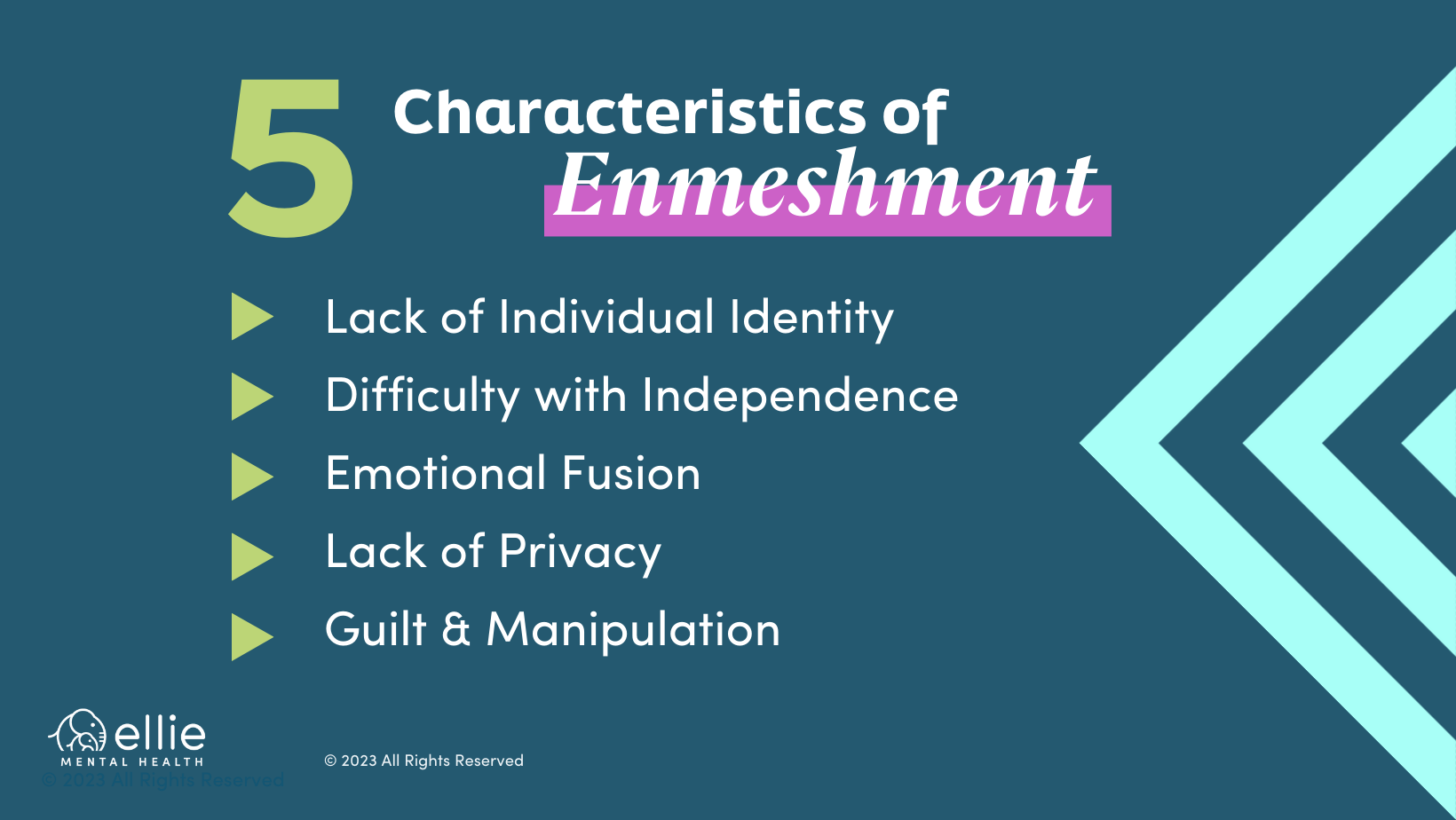Remember that last family gathering? Or are you secretly trying to forget it? If the latter is true, we get you. Our families have the power to make us laugh, cry, and then some. But family is also the cornerstone of our support system and has the power to shape our lives in profound ways. While close connections are integral to a thriving family, there exists a delicate balance between connection and enmeshment.
Enmeshment, characterized by blurred boundaries and an overly intertwined dynamic, can hinder personal growth and lead to emotional turbulence. Here, we’re going to unravel the complexities of enmeshment, shining a light on the importance of establishing and maintaining healthy boundaries within family relationships.
At Ellie Mental Health, we know that family can be your rock in a time of need, or the one blocking your path. Our goal is to empower you to cultivate balanced and nurturing family dynamics, fostering personal growth and self-discovery.
Are you looking for emotional support for building healthy family relationships? Find an Ellie location near you and get matched with an individual or group therapist who can help.
What Exactly is Enmeshment?

Have you ever felt stuck or trapped? Well, in a nutshell, enmeshment is basically being “entangled” in something; think giant spider web or being stuck in a fishing net. Obviously, neither of those scenarios sounds pleasant nor inviting. And when we apply this term to family situations, enmeshment can seem “sticky” to say the least.
Enmeshment occurs when individual identities within a family become intertwined to the extent that personal boundaries are unclear or nonexistent. While genuine connection is vital, enmeshment can stifle individuality, hinder autonomy, and give rise to emotional dependency.
A major problem if you’re struggling with establishing emotional and physical boundaries is that you might not even realize that you’re involved in an enmeshed relationship with your loved ones.
Recognizing the signs of enmeshment is the first step toward building healthier family dynamics:
- Lack of Individual Identity: Enmeshed families may struggle with allowing members to develop and express their unique identities. Personal interests, goals, and aspirations may become subsumed by the collective family identity.
- Difficulty with Independence: Members of an enmeshed family may find it challenging to make decisions independently. There may be a heightened need for validation or approval from other family members before taking action.
- Emotional Fusion: Emotions become shared rather than individually experienced. The emotional state of one family member has a direct impact on the emotional well-being of others, creating a web of interconnected feelings.
- Lack of Privacy: Enmeshed families may struggle with maintaining healthy levels of privacy. Boundaries around personal space, thoughts, and emotions may be inadequately defined.
- Guilt and Manipulation: Guilt can become a powerful tool for maintaining the enmeshed dynamic. Family members may feel compelled to prioritize the needs and desires of others over their own, leading to a cycle of manipulation and guilt.
What Does Living in an Enmeshed Family Look Like?
In most situations, being a close-knit family is a good thing. But let’s be perfectly honest — we all need our space. You may love your sister, but does she really need to scold you about what you should be doing in your professional life, or shame you when you don’t show up for a family dinner? Probably not.
What we’re saying is, it’s possible to be too close for comfort when it comes to certain family members. While being close can be great, having boundaries is necessary for personal growth — and for each individual’s overall well-being.
A few common enmeshed family characteristics include the following:
You Feel Guilty, Stuck, and Angry
The family unit can be a huge part of your success. But if you feel guilty for wanting to go out on your own, pursue goals that you feel passionate about or drawn to, or if you feel like you simply can’t do anything on your own, these are signs of enmeshment.
- Guilt and Obligation: You feel a strong sense of guilt if you pursue your interests or make decisions independent of the family’s wishes.
- Limited Independence: Independence and autonomy are discouraged, making it difficult to develop a strong sense of self.
- Lack of Individual Identity: It’s challenging to establish and maintain your own identity separate from the family unit.
Your Family Members Project Their Insecurities Onto You
Perhaps your father never developed his own identity fully, or maybe your mother lacks self-esteem. And she would never wear that dress, right? Situations like this are fairly common, however, projecting one’s insecurities onto another can be damaging to self-esteem and the development of a distinct sense of self. For example, you may hear comments such as:
- “You need to date someone in your own league.”
- “Dreams don’t pay the bills.”
- “You’re way too ambitious for your own good.”
It’s not uncommon for parents to see their children as extensions of themselves, or for older siblings to do the same. And they may even live vicariously through you from time to time. But you’re you, and they need to understand that. Clear lines must be drawn that separate your life from theirs. So, wear that dress, apply for your dream job, and ask that supermodel out on a date.
You Have Trouble Maintaining Close Friends or Romantic Relationships
You come home from work and don’t want to talk about what’s bothering you, so you give your significant other the cold shoulder. Or, you just didn’t agree with something your friend had to say, so you’ve been blowing them off for weeks. Sound familiar?
Healthy relationships include communication and the sharing of feelings, ideas, and opinions, even if these opinions and ideas aren’t agreed upon — which is OK. Because, in a healthy relationship, opinions and ideas are valued. However, in an enmeshed family, conflicting opinions are often not accepted. In fact, communicating feelings, ideas, and opinions is often avoided in an enmeshed situation because this can cause further emotional turmoil. Learn how to identify emotional triggers in this blog post.
Empowering Change
Breaking free from the effects of enmeshment requires a commitment to establishing and maintaining healthy boundaries. Let’s face it, we all want healthy family relationships. While you probably can’t wave a magic wand and change how your parents or siblings act or react, there are plenty of ways to begin establishing boundaries and creating your own space for growth.
Consider the following strategies to empower positive change within your family:
- Self-Reflection: Begin by reflecting on your own boundaries and recognizing areas where enmeshment may be present. Acknowledge the impact on your individuality and personal growth.
- Open Communication: Foster open and honest communication within your family. Encourage discussions about individual needs, goals, and desires, and actively listen to each other without judgment.
- Establishing Boundaries: Clearly define and communicate personal boundaries. This includes respecting individual privacy, allowing for independent decision-making, and supporting each other’s autonomy.
- Seeking Professional Guidance: If breaking free from enmeshment proves challenging, seeking the guidance of a family therapist or counselor can provide valuable insights and tools for navigating the process.
- Cultivating Individuality: Encourage and celebrate the pursuit of individual interests and goals. Embrace the diversity within the family and support each member in their journey of self-discovery.
Keep in mind, changing enmeshed family dynamics can be a tall order. This is why individual or group therapy sessions are highly recommended if you continue running into challenges that you can’t overcome on your own.
For parents with younger children, new parent counseling can be beneficial in helping to empower change.
Removing Yourself from Enmeshed Relationships
Breaking free from the effects of enmeshment and building healthier relationships is a courageous step toward cultivating a family environment that nurtures individual strengths and aspirations. As you navigate this journey, remember that change takes time and effort, and progress may come in small, incremental steps. But there’s plenty of room to celebrate small victories along the way!
By fostering open communication, establishing clear boundaries, and supporting each other’s individuality, families can create a space where love and connection coexist with personal autonomy. The end goal is not to sever connections — but to redefine them in a way that allows each family member to thrive independently and contribute to the collective well-being and greater mental health.
In embracing this transformative process, you can break free from the constraints of enmeshment, unlocking the potential for deeper, more meaningful connections. Remember, the journey toward healthier family dynamics is an ongoing exploration — one that leads to greater self-awareness, stronger relationships, and a more fulfilling family life.
As you embark on this path, even if you need a little help, you can find the strength to embrace change, the wisdom to navigate challenges, and the joy of discovering the unique gifts that each family member brings to the tapestry of your shared experience.
Are you dealing with family enmeshment and looking for the emotional space to build healthier relationships? Get started with Ellie Mental Health today.


